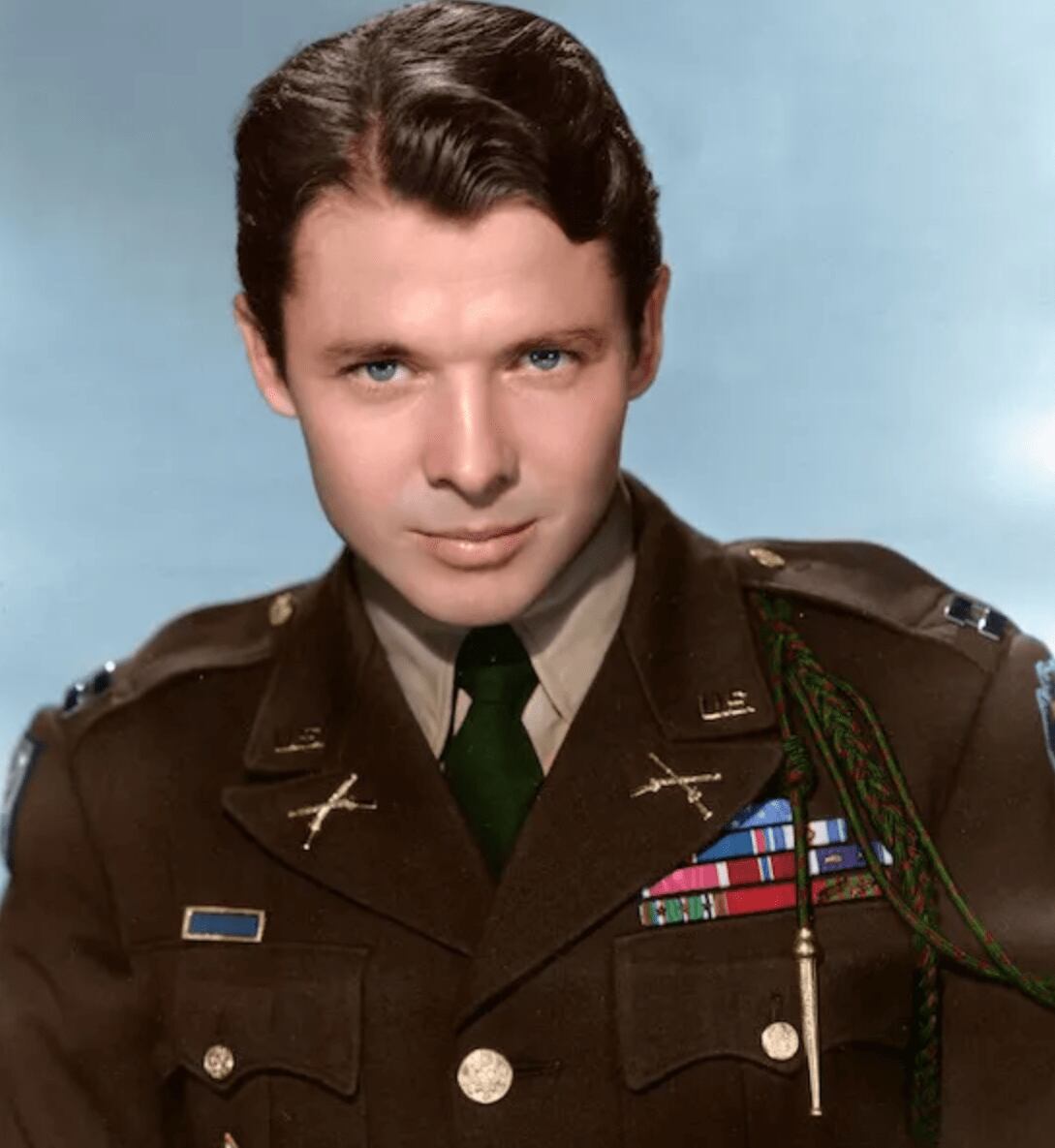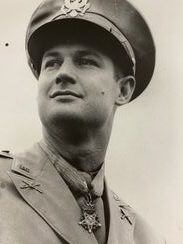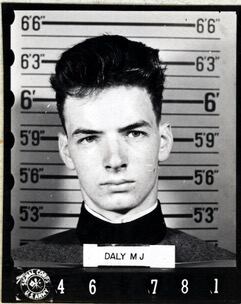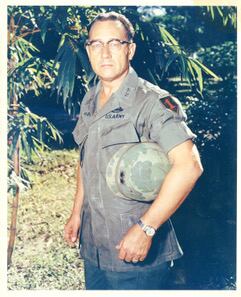Most Americans are familiar with the daring feats of the most decorated soldier in U.S. history, Audie Murphy. Scenes of the Colmar Pocket in France — Murphy climbing aboard a blazing tank destroyer, manning its machine gun, and single-handedly fighting off two reinforced companies of German infantry — may come to mind.
What is lesser known, or oft-forgotten, are the other hard fighting grunts of the 3rd Infantry Division, of which Murphy was a part.
From North Africa to the capture of Adolf Hitler’s lair in Berchtesgaden, Germany, the men of the 3rd ID slogged through it all, receiving the most medals of any other U.S. division in World War II along the way.
Discussing these feats and his latest work, “Against All Odds,” author, journalist and resident historian of the Friends of the National World War II Memorial Alex Kershaw sat down with HistoryNet to share why the older he gets “the more grateful and proud I am of those young, working-class Americans that fought and died and gave everything so that I could have the life that I have. That’s not an exaggeration.”
HistoryNet: You have a penchant for writing sweeping first-person accounts to deliver riveting WWII stories (“The Bedford Boys,” “The Liberator.”) What was your impetus for writing “Against All Odds”?
AK: I came across the fact that the 3rd ID had received more medals than any other U.S. division in World War II. Officially, there were 40 named recipients of the Medal of Honor from the 3rd ID — it’s almost a quarter of all the Medals of Honor given out in the European theater. They lost more men than any other division and I would argue that they spent more days in combat than any other division in Europe.
I didn’t really know what I was going to do in terms of a book, but I wanted to go meet someone from the 3rd ID, so around 2019 I went and interviewed Bob Maxwell, who was, at the time, the oldest living recipient of the Medal of Honor.
He told me his story and I thought to myself, the 3rd ID had been there in North Africa in November 1942 and had the great honor of liberating Berchtesgaden in 1945. Many people think that it was the 101st but it wasn’t, it was the 3rd ID. They made damn sure they got there first. They were there at the start of the war and completed this incredible journey. That journey is the story of the liberation of Europe.
To that point, it’s rare that you find a British author writing about Americans.
It was really pretty interesting when I first started, because people were like, “This carpetbagging Limey, coming over here, writing about us!” I wanted to write about Americans fighting in Europe because I lived in America.
I wanted to celebrate the people in this country. It’s just as simple as that.
The men you focus on in your latest book all served in the 3rd ID. All four received the Medal of Honor, which seems quite rare for a single unit. How would you describe the ethos of the division?
The culture of the division was determined by one individual — Truscott [Gen. Lucian Truscott]. When they were in training in North Africa, they had to perform what was called the Truscott Trot. He was a cavalryman and he believed that infantry units should be able to move with the speed and agility of cavalry, that they should be highly mobile [and] cover as much ground as possible. He believed in long, forced marches, but not walking, not marching, literally almost trotting.
The men practiced that at great length in North Africa, so when they got to Sicily and they were chasing the Germans the ethos was, “You got to chase them fast because they retreat fast and we have to catch them on the move.”
They were extremely well-trained, really tough on the ground, very, very fit and aggressive.
It’s interesting because they are not that famous today. You know, people think about the 29th, the 101st, the 82nd Airborne. The 3rd ID didn’t have a [George] Patton, they didn’t have a general who was going to grab the headlines.
They also didn’t fight on D-Day, they weren’t at the Battle of the Bulge — which have been turned into famous movies. They had these battles that were long, hard slogs that most people have forgotten.
It’s interesting you say the men were well-trained, because the Americans didn’t have the best showing at the beginning of the war in North Africa.
No, not at all. Dogface soldier is the division anthem and if you ever read the lyrics to that it would give you an idea of who they saw themselves as. The idea of “we’re nothing special” in terms of seeking glory and publicity. “We just get the job done. We’re grunts. Ask us to do something and we’ll do it.” And they did.

Of the four men you focus on, Audie Murphy is best known. Can you talk about the other three — Maurice “Footsie” Britt, Michael Daly and Keith Ware?
I chose Maurice Britt because he was the first U.S. soldier to receive every medal of valor, and by that I mean [the] Bronze Star, Silver Star, DSC (Distinguished Service Cross) and the Medal of Honor.
It was a big deal when that happened, and he was willing to go along with the notion that he should be raising awareness for war bonds and that he was a public figure. He was described as the Alvin York of World War II. He was in the same division as Audie Murphy, who would later overtake him in the medal count.
I liked the fact that he had been a professional football player for the Detroit Lions, and I liked the fact that he was there at the beginning. He was there in North Africa, for Sicily, all the way through Italy, where he gained the Medal of Honor in the fall of 1943.
He participated in four amphibious invasions: North Africa, Sicily, southern Salerno and then the fourth at Anzio. He had his arm blown off at Anzio.
He received the Medal of Honor on June 5, 1944, at the Razorback Stadium in Arkansas, where he played in college.
I always thought that that was really poignant because the next day, the 6th of June, 1944, became the so called “one and only D-Day,” but most of these guys had already been in four D-Days.

I became very attached to Michael Daly as one of the other characters. I was very struck by the fact that he dropped out of West Point and joined up as a private to go and fight. His first combat experience was on Omaha Beach on D-Day.
He could have had a very cushy war, as his father was Col. Paul Daly, who knew Alexander Patch. Daly initially drove Patch around in his car. He was a very bad driver. Patch joked at some point, “I’m not gonna get killed by the Germans, but this 20-year-old kid is gonna kill me.” [laughs]
Daly could have ridden out the war in Patch’s headquarters, but he said no and joined the 15th Infantry Regiment at a time when the regiment had been really battered. Many of the guys who had been fighting had been traumatized — they had been through hell. By the end he had earned three Silver Stars, the Medal of Honor … the only medal he didn’t receive was the DSC. I just couldn’t believe that he was a company commander at 20 years old.
I was very moved by the fact that when he went back to the U.S. he struggled to adapt. He was looking for a cause greater than himself — for a mission in life that was as energizing and all-consuming as that of a company commander. For a long time, Daly struggled to find that, as I think a lot of those young men did. They were put in positions of great responsibility amid extreme danger, and thrived.
That struggle upon returning is understandable. What are you supposed to do back in the U.S., after all, when you’ve just finished saving the world?
Exactly. What do you do? A full company would be 180-200 guys — although that was never the case because they were always under strength. But in theory you have a 20-year-old in charge of 200 Americans.
Towards the end of the war in Nuremberg, Daly was doing everything. He did everything that he could first, ahead of the scouts. And the reason why he did that was because he wanted to keep those kids alive. That was an example of complete selflessness. Beautiful altruism.

When I was at college I studied philosophy for a while — this is a bit of a side angle — but I had to do an essay about altruism. Michael Daly was the definition of pure altruism. He was going to give his life willingly, at any second, to save the lives of other people. His Medal of Honor citation explains that perfectly. His actions seem to typify so many actions that I came across in 3rd ID.
You said in a recent interview that it was actually a small number of men who made a big difference in WWII. Can you expand on that?
This past September, I followed the route of the 3rd ID from Saint Tropez all the way to Colmar. I was in the vineyard where Audie Murphy lost his best friend, Lattie Tipton. We were within a stone’s throw of where Murphy’s action for the DSC happened. My point is, is that it’s really long way.
When we got to Colmar you see that you’re almost at the border of what was the Third Reich and I thought, “Oh, my God, if you’d landed in Casablanca in 1942 and you were still fighting and you saw that?” That’s a long, long way. It is an epic odyssey.
I think my point is, is that along that way, there were villages and towns and hillsides, streams and rivers that all have to be crossed. That comes down to individual soldiers. And if you look at some of the citations for the Medal of Honor for those in the 3rd ID it’s not an accident — individuals made a big difference.
I think you could say that many of the Medal of Honor recipients were men who were aggressive and daring and were prepared to attack and put their lives on the line to go after the enemy. But there weren’t that many. We have this idea that everyone was up for it during the war, but most just wanted to stay alive.
The U.S. had this beautifully attuned capitalist system to turn out what we needed in terms of materiel to win that war. But people still had to fight on the ground. However many weapons we had, however many Sherman tanks we had, we still had to win on the ground. It was critical that people stepped up. There were many people who were doing their jobs, but few who went above and beyond, which, from my point of view, is why the Medal of Honor rewards that kind of action.
I had the opportunity to interview Hershel “Woody” Williams and something he said has stuck with me — receiving the Medal of Honor saved his life because it forced him to talk about the worst moment of his life. His brother, who died young, fought in Bastogne and never emotionally recovered. How would you say these young men emotionally coped after coming home?
For many it was a mix. For Audie Murphy, I know that it was a burden to carry the moniker of the most decorated soldier of World War II. I write in my book about an Esquire journalist who went and interviewed Murphy in his 60s and he didn’t even have his full set of metals. Apparently, he had given some of his medals away to kids in the neighborhood.
I know that Michael Daly was a reluctant public hero when he came back. After his Medal of Honor ceremony at the White House, he was driving back to Connecticut and he said, “I wish my father had been the one that received the medal, not me.”
To be paraded as this public hero when you are deeply traumatized, when you are trying to recover — Daly had been shot through the face and was struggling to readjust to peacetime — it was difficult for a lot of them.
Keith Ware was incredibly modest. There were very few interviews and there was very little information about him that I could find. I never came across one interview with him in which he talks about the medal. He may have, but I couldn’t find anything.

It’s a small community of men and you’re under scrutiny, you’re under the microscope. I think they were incredibly proud.
[Bob] Maxwell said to me, “I’m no hero.” He received the medal because a grenade landed near him and he instinctively smothered it. He said, “I didn’t make a decision to do that. It was a split second and I just did it. I’ve been defined by a moment that I didn’t make a clear decision about.”
There are sadly no remaining Medal of Honor recipients from WWII. What would you say is an appropriate way to honor these men, not only on National Medal of Honor Day but throughout the year?
Whether it’s National Medal of Honor Day, Memorial Day or Veterans Day, I think that what all the World War II veterans I’ve interviewed would want most is for people to remember them, their brothers — to not forget and to remember them in a way that goes beyond just saying glibly, “Thank you for your service.” Remember what it took, what was sacrificed, what was given.
I think the lesson is that people are capable. People can be incredible. They can show us so much that’s unimaginable when they have a cause that’s greater than themselves.
This story originally appeared on HistoryNet.
Claire Barrett is the Strategic Operations Editor for Sightline Media and a World War II researcher with an unparalleled affinity for Sir Winston Churchill and Michigan football.





